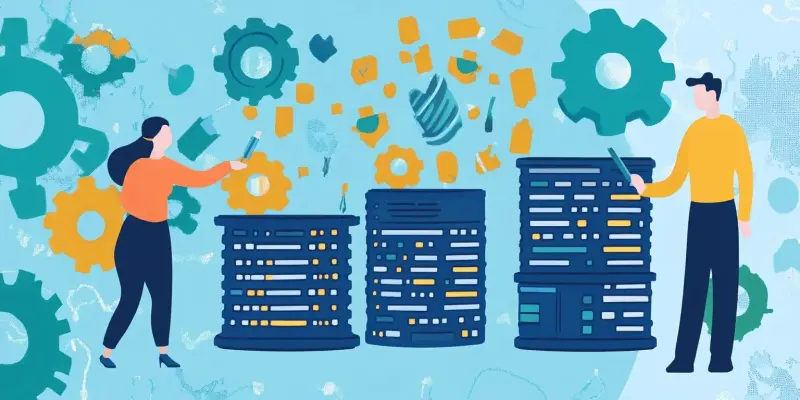As the world becomes increasingly data-driven, data engineering is undergoing transformational changes that promise to enhance operational efficiency and innovation by 2025. Various technological advancements, regulatory changes, and business needs are driving these trends, which can significantly impact how data is managed, secured, and used to make decisions. With digital transformation trends becoming more pronounced, companies are ever more reliant on cutting-edge data engineering methodologies to remain competitive and adaptable. This article examines the top nine data engineering trends that are projected to significantly shape the industry landscape by 2025.
Generative AI-Based Data Management and Data Mesh Architecture
One of the most significant trends in data engineering is the use of generative AI to autonomously control data management processes such as data cataloging and threat detection. This approach is expected to result in improved data quality and accessibility, as AI systems can efficiently organize vast amounts of data and identify potential risks more quickly than traditional methods. Generative AI can streamline data workflows, automate repetitive tasks, and even generate predictive models and annotations, making data management more intuitive and less labor-intensive.
Another transformative trend is the adoption of Data Mesh Architecture, particularly by large companies looking to manage data as a product. This architectural paradigm emphasizes decentralized data ownership, allowing teams within an organization to operate independently yet collaboratively. Instead of a centralized data team handling all data-related tasks, each team or department is responsible for its own data products, fostering a more scalable and flexible data environment. This approach encourages seamless data sharing and collaboration across departments, enhancing overall scalability and operational efficiency.
DataOps for Scalability and Stronger Data Security and Privacy
DataOps, inspired by the DevOps movement, focuses on the need for collaboration and automation in data engineering. This trend aims to manage scalable data pipelines and improve operational agility, allowing organizations to quickly adapt to changing business needs. By emphasizing communication between data engineers, data scientists, and IT operations teams, DataOps helps ensure that data flows efficiently from collection to analysis. Automation tools in DataOps can handle repetitive tasks, reduce errors, and speed up the time-to-insight, making data operations more agile and responsive.
With growing regulatory requirements and increasing concerns over data breaches, there is a rising need for stringent data security measures. Stronger data security and privacy protections are becoming essential as organizations must comply with legislation and safeguard sensitive information. Methods such as encryption, tokenization, and data masking are being adopted to ensure data protection throughout pipelines. These techniques help to prevent unauthorized access, protect personal data, and maintain data integrity, thereby building trust among consumers and partners.
AI/ML-Powered Data Engineering and Real-Time Analytics and Streaming Data
The integration of AI and machine learning into data engineering processes is automating workflows and accelerating data analysis. AI/ML-powered tools provide real-time insights that facilitate faster decision-making and enhance enterprise value. These technologies can process vast datasets in seconds, identifying trends and patterns that might be missed by human analysts. By leveraging AI and ML, companies can optimize operations, predict future trends, and gain a competitive edge in their markets.
Real-time analytics and streaming data are also revolutionizing how businesses handle and use data. Tools like Apache Kafka enable real-time processing of data streams, allowing organizations to tailor customer experiences and improve operational efficiency. By processing data as it is generated, companies can respond to market changes more rapidly and make more timely decisions. This capability is especially crucial in industries where customer preferences and behaviors can shift quickly, such as e-commerce, finance, and telecommunications.
Focus on Data Observability and Democratized Data Engineering
Emphasizing data observability is crucial for ensuring robust data pipelines. Data observability allows enterprises to monitor the performance of their data workflows, preempt anomalies, and ensure data reliability. This proactive approach helps in reducing downtime, maintaining data accuracy, and building trust in data systems. By continuously observing and reacting to data pipeline conditions, organizations can ensure that their data-driven decisions are based on accurate and reliable information.
Low-code and no-code platforms are democratizing data engineering by enabling users with minimal technical knowledge to design and manage data pipelines. This trend reduces dependency on specialized data teams and expands data accessibility within organizations. Such platforms are designed to be user-friendly, allowing business users to create workflows and process data without needing in-depth programming skills. This democratization can accelerate data initiatives and empower more team members to contribute to data-driven projects.
Sustainable Data Practices
As the world becomes more focused on data, the field of data engineering is experiencing significant transformations that aim to boost operational efficiency and foster innovation by 2025. Technological advancements, regulatory shifts, and evolving business needs are the primary drivers of these trends, expected to greatly influence the way data is managed, secured, and utilized for decision-making. The rise of digital transformation trends highlights the increasing dependency of companies on advanced data engineering techniques to stay competitive and flexible. This article delves into the top nine data engineering trends predicted to substantially impact the industry landscape by 2025. From the adoption of artificial intelligence and machine learning in data processing to heightened data security measures and the use of cloud technologies for scalable data solutions, these trends underscore the pivotal role of data engineering in modern business environments. The integration of real-time data analytics, heightened focus on data governance, and the growing importance of data privacy are also instrumental in shaping the future direction of the field.

